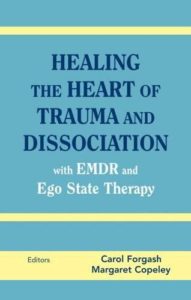Healing the Heart of Trauma and Dissociation with EMDR and Ego State Therapy
Book Course
Edited by Carol Forgash, LCSW and Margaret Copeley, M.Ed.
Book Description: The powerful benefits of EMDR in treating PTSD have been solidly validated. In this groundbreaking new work, nine master clinicians show how complex PTSD involving dissociation and other challenging diagnoses can be treated safely and effectively. They stress the careful preparation of clients for EMDR and the inclusion of ego state therapy to target the dissociated ego states that arise in response to severe and prolonged trauma.
Self-Study Book Course: This self-study book course has been developed for EMDR practitioners to help them provide successful EMDR treatment to clients diagnosed with complex trauma. Complex trauma victims have problems dealing with triggers, dissociation, affect disregulation, and stress. They require a tri-phasic trauma treatment approach integrated into the EMDR protocol: including 1: stabilization, 2: EMDR trauma processing and 3: resolution. (Please be aware the book must be purchased separately and it is NOT sold on this website.)
“Healing the Heart of Trauma and Dissociation with EMDR and Ego State Therapy” provides therapists with a comprehensive treatment approach that weaves ego state and dissociative treatment strategies into the EMDR protocol to help overcome these specific problems.
The material compiled in this book covers a range of theory—including the neurobiology of dissociation and the use of hypnosis, family systems therapy, and cognitive schemas. It also includes diagnostic categories (the spectrum of dissociative disorders and in particular dissociative identity disorder) and several client populations (couples, terror survivors).
The case studies described in each chapter ground theory in practical application, illustrating the phased treatment techniques involved in preparing clients with Ego State therapy and related modalities within the EMDR protocol.
The book course provides an opportunity for EMDR trained clinicians to learn how to apply this integrative EMDR treatment in their practice while earning 8 EMDRIA CE credits.
NY STATE HAS APPROVED THE BOOK COURSE FOR 8 CEUs FOR SOCIAL WORKERS
PLEASE NOTE: This course is not a substitute for the EMDR Basic Training and does not qualify as training in EMDR.
Program Objectives
- Clinicians will understand the various theories of dissociation and current attachment theory. They will have an understanding of the neurobiology of dissociation and how attachment problems and dysregulated physiological systems play a part in the development of dissociation.
- Clinicians will be able to identify the tri-phase trauma model of treatment and how it can be integrated into the eight phase EMDR protocol.
- Clinicians will understand ego state theory and therapy principles and how and when to integrate them into the tri-phase trauma model. They will learn how to work with ego states in each phase of the EMDR protocol.
- Clinicians will be able to identify skills, interventions and modalities to teach in the stabilization phase that help clients manage symptoms of dissociation and deal successfully with problems of affect regulation.
- Clinicians will learn how to assess clients for dissociative problems and to determine the kind of dissociative disorder and type of PTSD (i.e. DID, DDNOS, complex PTSD) so that they can develop a treatment plan and determine which stabilizing interventions to utilize.
- They will learn the red flags that indicate a need for a longer stabilization phase of treatment prior to EMDR trauma processing and the technical challenges they may encounter in working with dissociative clients, especially those with Dissociative Identity Disorder.
- Clinicians will learn new treatment approaches in the EMDR treatment of Dissociative Identity Disorder: ACT-AS-IF approach for preparation phase work and the ARCHITECTS process for conducting EMDR sessions.
- Clinicians will learn readiness criteria for moving clients from stabilization into the trauma processing phase of EMDR treatment.
- They will learn how to combine hypnosis with EMDR and ego state work for ego strengthening in the preparation phase of treatment, stressing the importance of nurturing ego strength in clients suffering from complex post-traumatic stress disorder.
- Clinicians will learn how Cognitive Schema Work is useful in combination with ego state work to identify maintenance of irrational beliefs and behaviors and how schema work is used to identify the most accurate negative cognition.
- They will learn how to reverse dissociative processes in order to preserve emotional safety and prepare for trauma processing and deal appropriately with avoidance defences which can stall processing if ignored.
- Clinicians will learn how to successfully use EMDR-ego state integrated treatment with personality disorders.
- They will understand and be able to utilize ego state work in the EMDR treatment of couples. Using a contextual framework to understand the many ‘selves’ that participate in the relationship of the couple will help the clinician provide practical psycho-information in the preparation stage of treatment
- Clinicians will gain an overview of Family Systems Therapy, another form of ego state therapy and its use in an integrated EMDR treatment
- Clinicians will understand how to work collaboratively with primary therapists who refer a client with a dissociative disorder, or complex PTSD, for EMDR. They will be cognizant of the complexities in the two therapist approach as well as advantages to the client.
Table of Contents
Foreword, John G. Watkins, PhD
Preface, Carol Forgash and Margaret Copeley
Acknowledgments
Integrating EMDR and Ego State Treatment for Clients with Trauma Disorders,Carol Forgash and Jim Knipe
- She’s Come Undone: A Neurobiological Exploration of Dissociative Disorders, Uri Bergmann
- Combining Hypnosis with EMDR and Ego State Therapy for Ego Strengthening, Maggie Phillips
- Changing Cognitive Schemas through EMDR and Ego State Therapy,Michael C. Paterson
- Treating Dissociative Identity Disorder with EMDR, Ego State Therapy, and Adjunct Approaches, Sandra Paulsen
- Loving Eyes: Procedures to Therapeutically Reverse Dissociative Processes while Preserving Emotional Safety, Jim Knipe
- Hidden Selves: Treating Dissociation in the Spectrum of Personality Disorders, Uri Bergmann
- EMDR in Couples Therapy: An Ego State Approach, Barry K. Litt
- The Integration of the Internal Family Systems Model and EMDR,Joanne H. Twombly and Richard C. Schwartz
- Applying EMDR and Ego State Therapy in Collaborative Treatment,Carol Forgash
Ce-Classes.com is approved by:
The American Psychological Association (APA) – Ce-Classes.com is approved by the American Psychological Association to sponsor continuing education for psychologists. Ce-Classes.com maintains responsibility for this program and its content.
- Ce-Classes can provide CE’s for Social Workers in most states using other approvals.
- The National Association of Addiction Professionals (NAADAC) Provider #656
- The Florida Board of Clinical Social Work, Marriage and Family Therapy and Mental Health Counseling Provider #852 BAP-Expires 3/31/2016
- The California Board of Behavioral Sciences. Continuing Education Provider – PCE 4297 Expires 6/30/2016.
- The California Association of Alcoholism and Drug Abuse Counselors (CAADAC) Provider Number OS-12-174-1116 Expires 11-2016
- The Texas Board of Social Work Examiners, Continuing Education Provider – 5674 expires 4/30/2016.
- The Texas Board of Professional Counselors, Continuing Education Provider – 1622 expires 2/28/2016.
- Massachusetts Authorization Number: 1240
- Ohio Counselor, Social Worker and Marriage and Family Therapist Board – Provider # RCST031201 Expires 5/31/2017
- The Florida Board of Nursing (CE Provider #: 50-4896) Expires 10/31/2015 Do not send certificates to the Florida Board of Nursing. You must keep this certificate for 4 years.
- The California Board of Registered Nursing. CEP 15647 Expires 11/30/2015.
Additional Information
EMDRIA:
AEP is a provider approved by EMDRIA. This book course is approved for 8 credits. To receive EMDRIA credits you must have completed the entire EMDR basic training.
TESTING MEASURE:
60 question multiple-choice test.
REQUIREMENTS:
Completion of test, receipt of Evaluation and signed Verification of EMDR Training Form.
FEES:
$120 includes test and CE certificate of completion issued by CE-Classes.com.


